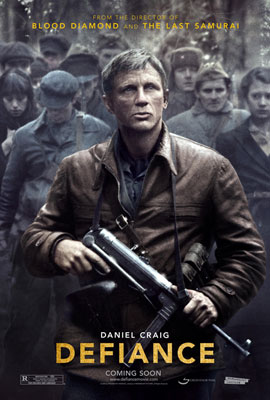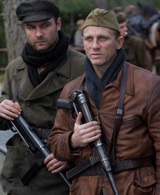Defiance – Movie Review

Defiance from Paramount Vantage is about conflict—conflict between brothers, between uneasy allies and between Jews and non-Jews.
The film focuses on a portion of the history of the Bielski partisans—a band of armed Jewish fighters in the forests of western Belarus—between the summer of 1941 and the spring of 1942. Tuvia Bielski was the leader and built his band up from a small group of fugitives to a organized community of more than 1,200.
The relationship between Tuvia (portrayed by Daniel Craig) and his brother Zus (Liev Schreiber) is one of the main sources of tension in the film. After their village is liquidated they are forced to escape into the woods with their younger brothers Asael (Jamie Bell) and Aron (George Mackay).
{default}Slowly, the brothers build up their resources, starting with just a hatchet, a pistol and four bullets. They acquire rifles and submachine guns and eventually launch guerilla raids and assassinations. They also forge a community in the woods, building a semi-permanent settlement with underground dugouts, a kitchen, mill, bakery, school and infirmary. Although pregnancies are forbidden, men of the community take "forest wives."
Zus Bielski is focused on revenge and acts of violence, preferring a more aggressive plan to actively fight the Germans and their collaborators. Tuvia, more diplomatic and compassionate than his brother, is a peacemaker and is always willing to help those in need.
The attempts by men like Tuvia to maintain their humanity while the Germans seek to destroy them is one of the major conflicts within the film: "We are hunted like animals, but we will not become animals," Tuvia says.
 This dichotomy is highlighted in one particular scene, where the director, Edward Zwick, cuts back and forth between a wedding ceremony conducted at the forest camp and a bloody raid against German troops.
This dichotomy is highlighted in one particular scene, where the director, Edward Zwick, cuts back and forth between a wedding ceremony conducted at the forest camp and a bloody raid against German troops.
Aside from the final, climatic battle, most of the combat scenes are fairly realistic. The Bielski partisans, far from being a professional band of killers, first engage the Germans in a series of sloppy, personal and bloody fights.
The Bielski partisans and their erstwhile allies in the Red Army partisan faction have an uneasy relationship. The Bielskis supplied the Soviets with logistical support and supplies, but the soldiers were reluctant to reciprocate by sharing medicine or providing military assistance. Jewish fighters who joined the Soviet faction also experienced anti-Semitism, even though such sentiments were considered anti-revolutionary.
There were also conflicts within the Bielski faction between fighters and non-combatants (referred to as malbushim, Hebrew for clothes). In the film, Tuvia is shown as the creator of a egalitarian society, where both men and women are trained to shoot and everyone gets the same rations. However, the book Women in the Holocaust by Dalia Ofer and Lenore Weitzman paints a different picture. Some members of the Bielski brigade told the authors that the Bielskis ate better and that fighters had the first pick among women for sexual partners.
"There is no equality in any place and there was no equality in the forest either," one survivor testified.
The film has also been criticized for ignoring possible atrocities committed by the Bielski partisans, including the massacre of 128 Poles from Naliboki in 1943. Although Soviet partisans conducted the action, Bielski fighters allegedly supported them, although former fighters deny it.
The film does acknowledge the policy of Bielski partisans to execute any Germans who surrendered and portrays the killings as an orgy of revenge by grief-stricken survivors.
Sticklers for accuracy might be disappointed the dialogue is delivered in English with a light faux-Slavic accent; only a few scenes are conducted in German or Russian with subtitles. In a few instances, Craig’s British accent seeps through. Also, the story of the Bielski partisans as presented in the film is incomplete because the group operated until Belarus was liberated in 1944.
Overall, however, Defiance does a good job of telling the largely unknown story of a heroic band of Jewish fighters and of portraying life in a partisan camp.
Editor’s note: In an interview with History Net, award-winning director and producer Edward Zwick talks about the making of Defiance and his interpretations of the story.
ACG Intel


Please, spare us: “the policy of Bielski partisans to execute any Germans who surrendered”
It was a common policy by all partisan forces during WWII with very rare exceptions.
http://en.wikipedia.org/wiki/Eugenio_Cal%C3%B2
The bad thing that the movie depicts its as an orgy – it was rather common and unpleasant chore.
it’s true: “there is no equality in any palce. . . .” it happens then, it’s still happening now. . . in every place, be it be in the cities or in the forest. . .